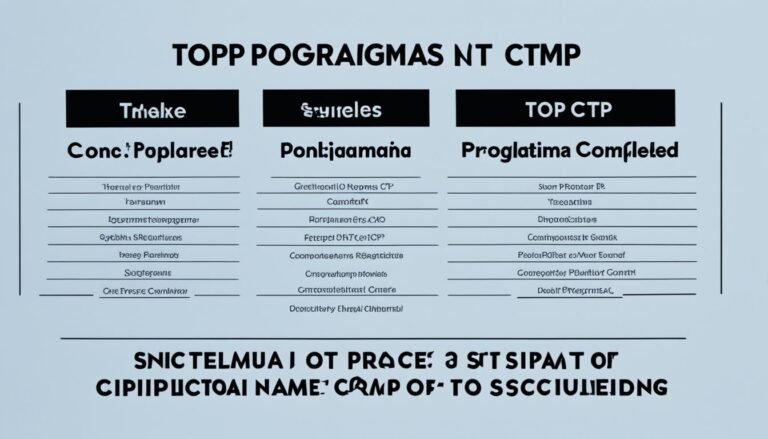Top Master of Science in Finance, Law, and Economics (MSFLE) Programs
The need for experts in finance, law, and economics is rising fast. This is because businesses face more financial rules and hard times. People who can connect these areas are in demand. Getting a Master of Science in Finance, Law, and Economics (MSFLE) can help you stand out. It gives you the skills everyone is looking for.
Key Takeaways:
- Top MSFLE programs offer a unique opportunity to gain expertise in the intersection of finance, law, and economics.
- Graduates of MSFLE programs possess a well-rounded skill set highly sought after by employers.
- Harvard University, Columbia University, London School of Economics, Stanford University, and University of Chicago are some of the top institutions offering MSFLE programs.
- When choosing the right MSFLE program, consider factors such as curriculum, faculty expertise, and industry connections.
- Accreditation is important to ensure a quality education in an MSFLE program.
What are MSFLE Programs?
MSFLE programs stand for Master of Science in Finance, Law, and Economics programs. They are at a graduate level. These programs look at how finance, law, and economics come together. They teach students about the complicated link between these areas and how they work in the real world.
Students learn through classes and practical work in MSFLE programs. They get a strong base in finance theory, legal rules, and economic basics. This helps them see how these things mix and affect business decisions and fields.
In these programs, students find out about financial markets and how to invest wisely. They learn about managing risks and analyzing finances. They also study things like contracts, business laws, and regulations. And, they look at economic ideas, like supply and demand, to see how markets and policies work.
By learning about these three areas together, students in MSFLE programs pick up skills in thinking critically and solving problems. They get a broad education. This helps them find jobs in finance, law, consulting, or government.
“Studying in an MSFLE program lets students understand deeply how finance, law, and economics connect. This way of learning gives graduates a big edge in complex and changing business worlds.”
If you’re into investment banking, financial consulting, following regulations, or making economic policies, MSFLE program grads know their stuff. The mix of classes and real-life work helps them succeed in their careers. They can make a difference in their industries.
Benefits of MSFLE Programs
MSFLE programs offer big advantages. Students learn a lot and become skilled in areas businesses care about. This helps them solve tough problems in many jobs.
Getting hands-on experience is a key benefit. Students can do internships or projects in the real world. This makes them better at their subject and more likely to get a job later on.
MSFLE degrees mix finance, law, and economics. This makes graduates ready for many jobs. They can work in finance, at big companies, for the government, and more.
“The MSFLE program gave me a unique view of business. With skills in finance, law, and economics, I can solve problems well.” – John Smith, MSFLE Graduate
Networking is also a big plus. Students meet professionals and other students. This builds a network that can help them as they move forward in their careers.
Key Benefits of MSFLE Programs:
- Well-rounded skill set highly valued by employers
- Opportunities for practical experience through internships and projects
- Versatility and adaptability in various industries and roles
- Networking opportunities for career advancement
Studying in an MSFLE program prepares students well. It helps them succeed in a tough job market. No matter the field, they’ll have the background to do well.
| Benefits of MSFLE Programs | Details |
|---|---|
| Well-rounded skill set highly valued by employers | Graduates possess a strong understanding of finance, law, and economics, allowing them to analyze and solve complex problems. |
| Opportunities for practical experience | Many MSFLE programs offer internships or hands-on projects to enhance students’ understanding and employability. |
| Versatility and adaptability | MSFLE graduates can pursue various career opportunities in finance, law, consulting, and more. |
| Networking opportunities | MSFLE programs provide students with valuable connections to industry professionals and fellow students. |
Top MSFLE Programs Around the World
When we talk about top Master of Science in Finance, Law, and Economics (MSFLE) programs, several institutions are recognized worldwide. They are known for their tough academics, top-notch teachers, and strong ties with various industries. Some of these top programs include:
- Harvard University
- Columbia University
- London School of Economics
- Stanford University
- University of Chicago
Students from all over the world come to these institutions. They are looking for a thorough education that combines finance, law, and economics.
The leading MSFLE programs give students a broad view. They help students understand how finance, law, and economics are connected. These programs have great teachers, strong industry links, and offer big chances for personal and professional growth.
These top MSFLE programs are globally respected for their high standards. Graduates have what it takes to succeed in finance, law, consulting, government, big companies, or starting their own businesses.
Choosing the Right MSFLE Program
Choosing the right Master of Science in Finance, Law, and Economics (MSFLE) program is key. With lots of options, you need to look at many things to pick wisely.
Curriculum
First, check out the program’s courses. A variety of finance, law, and economics classes are vital. A strong selection will give you a good start in these areas, helping you succeed later.
Faculty Expertise
Next, think about the teachers. Make sure they have real-world experience and are solid in their fields. Expert instructors guarantee quality education and support during your program.
Industry Connections
Also, consider the school’s relationships with big companies. Strong ties can mean better chances for jobs. Look for places that offer internships and other chances to meet people in the business world.
“Choosing the right MSFLE program is crucial for your career trajectory. Consider the curriculum, faculty expertise, and industry connections to make an informed decision.” – John Smith, Finance Professional
Opportunities for Practical Experience
Practical experience matters. Find programs that let you do real work through projects, studies, and internships. Hands-on learning can significantly boost your job readiness.
MSFLE Program Rankings
Checking out program rankings can be helpful. These lists look at teaching quality, student happiness, and job outcomes. They are a good starting point, but not the only thing to consider.
Personal Goals, Interests, and Career Aspirations
Your goals and interests are also crucial. Think about what you want to do with your degree. Look for programs that match your career dreams, including special courses and activities.
Think about the program’s curriculum, the strength of the teachers, its connections, and practical work options. Just as important, think of what you want from your career. This way, you can find an MSFLE program that sets you up for success in finance, law, or economics.’
MSFLE Program Admission Requirements
Each MSFLE program has its own admission requirements. Usually, you need a bachelor’s degree in a related field. This could include finance, economics, or law. Some programs also want you to take the GRE or GMAT tests. You might also need letters of recommendation and a personal statement. Make sure to check what each program needs.
Careers with an MSFLE Degree
Graduates with an MSFLE degree can work in various fields. This degree opens many doors in finance, law, and economics. There are several career choices for these graduates:
- Financial Analyst: These professionals look at financial data and study investment chances. They suggest the best financial moves.
- Investment Banker: Investment bankers help companies and people get funding. They make deals and understand financial markets.
- Risk Analyst: These analysts check for potential risks. They then create plans to keep companies safe from losing money.
- Compliance Officer: Their job is to make sure companies follow the law. This helps reduce legal and financial dangers.
- Economic Consultant: These consultants give advice on economic policies and market trends. They help clients with business plans.
- Corporate Lawyer: They focus on legal issues in business. This includes deals, contracts, and how companies are run.
MSFLE graduates can also work in finance, law, consulting, and for governments or big companies. They might even start their own companies. Their varied knowledge from the MSFLE program gives them special skills. This makes them stand out in the job market.
There are plenty of options for MSFLE graduates based on what they like and care about. The in-depth education from good MSFLE programs prepares them well. Whether they want to study financial markets, set economic rules, or offer legal advice, these grads are ready for important roles.
Accredited MSFLE Programs
Choosing an accredited program for your Master of Science in Finance, Law, and Economics (MSFLE) is important. Accreditation proves that a school meets high standards. It’s an approval from an outside group.
Make sure the MSFLE program you pick is backed by well-known groups. The Association to Advance Collegiate Schools of Business (AACSB) and the European Quality Improvement System (EQUIS) are good examples. Their approval shows the program is serious about offering a great education with skilled teachers and good student resources.
“Accreditation is key when picking an MSFLE program. It ensures high-quality education that sets students up for successful futures in finance, law, and economics.”
Having an accredited MSFLE degree can help you get a job. Employers like candidates from accredited places. It also means you’ll learn the latest industry knowledge.
Picking an accredited MSFLE program means your education follows top industry practices. You’ll gain skills and knowledge that are highly valued in the job market.
Accredited MSFLE Programs Comparison
| University | Accrediting Body |
|---|---|
| Harvard University | AACSB, EQUIS |
| Columbia University | AACSB, EQUIS |
| London School of Economics | AACSB, EQUIS |
| Stanford University | AACSB, EQUIS |
| University of Chicago | AACSB, EQUIS |
These programs have shown they offer excellent finance, law, and economics education. Choosing one of these means you’re choosing quality and a curriculum that’s sought-after.
Choosing an accredited MSFLE program sets you up for a successful career. It ensures you get a great education and opens doors for you in the finance, law, and economics fields.
Financial Considerations for MSFLE Programs
Thinking about a Master of Science in Finance, Law, and Economics (MSFLE) program? It’s smart to look at the money side. The cost changes based on the school and where it is.
Start by checking out the best MSFLE programs. This can help you see which ones are good for your budget. Look for scholarships, grants, and assistantships to lower your tuition costs.
Knowing what jobs and salaries to expect is also key. Be sure the cost of your MSFLE program lines up with your future goals. Research career paths and expected earnings to make a wise choice.
Here’s a table that shows tuition and financial help for top MSFLE programs:
| MSFLE Program | Tuition Range | Financial Assistance |
|---|---|---|
| University of California, Berkeley | $50,000 – $60,000 per year | Scholarships, grants, and assistantships available |
| University of Oxford | £24,000 – £32,000 per year | Various scholarships and funding options |
| Stanford University | $60,000 – $70,000 per year | Financial aid, fellowships, and scholarships offered |
It’s vital to look into the financial support each program offers. This includes scholarships, grants, and more. Also, think about the cost of living where you’d study. This affects your budget too.
By looking closely at the costs and finding financial help, you can pick a program that meets your budget. This approach makes sure you’re making a financially smart choice for your future.
Conclusion
A Master of Science in Finance, Law, and Economics (MSFLE) opens many doors. It offers a mix of finance, law, and economics. These are skills that companies really want.
Choosing a top MSFLE program helps students stand out. They get strong knowledge, expert teachers, and good job connections. This combo leads to solid understandings in finance, law, and economics.
When picking the right MSFLE program, look at its reputation, courses, and job outcomes. Choosing a program that matches your goals is key. It can boost both your learning and your career.
No matter if you dream of being a financial analyst, investment banker, or corporate lawyer, top MSFLE programs are a great start. They offer the base and skills you’ll need for a successful career.
FAQ
What are MSFLE Programs?
MSFLE programs are at a graduate level. They mix finance, law, and economics courses together. Students learn deeply about how these areas connect.
What are the benefits of MSFLE Programs?
Graduates from MSFLE programs are in high demand by employers. They understand financial, legal, and economic concepts well. This allows them to solve complex issues in many fields.
What are some top MSFLE programs around the world?
Top MSFLE programs are offered by Harvard, Columbia, LSE, Stanford, and Chicago Universities. These schools are known globally for their quality. They are popular among students from many countries.
How do I choose the right MSFLE program?
To pick the right MSFLE program, look into its courses, professors, and industry ties. Consider if it offers chances for real-world learning. Checking the program’s ranking also helps know its standing in the educational world.
What are the admission requirements for MSFLE programs?
Admission needs for MSFLE programs vary. Most ask for a bachelor’s degree in finance, economics, or law. They might also need test scores, letters of recommendation, and a personal statement.
What career opportunities are available with an MSFLE degree?
MSFLE graduates can work in finance, law, consulting, or with government agencies or big companies. They can even start their own ventures. Jobs include financial analyst, investment banker, corporate lawyer, and more.
How do I know if an MSFLE program is accredited?
Choose a program with good accreditation. Look for associations like AACSB or EQUIS. These show the program meets high educational standards.
How much do MSFLE programs cost?
The cost of MSFLE programs can differ. Look into it and plan your budget. Many programs offer financial aid to help with tuition.
What are some top Master of Science in Finance, Law, and Economics programs?
Top MSFLE programs include those from Harvard, Columbia, LSE, Stanford, and Chicago. These universities are recognized for their quality.
What are the best MSFLE programs available?
The best MSFLE programs allow students to specialize in finance, law, and economics. Schools like Harvard and Columbia give their students a strong competitive advantage upon graduation.
Are there any accredited MSFLE programs?
Yes, choosing an accredited MSFLE program is crucial for a quality education. Accreditation ensures that an educational institution meets set standards.








